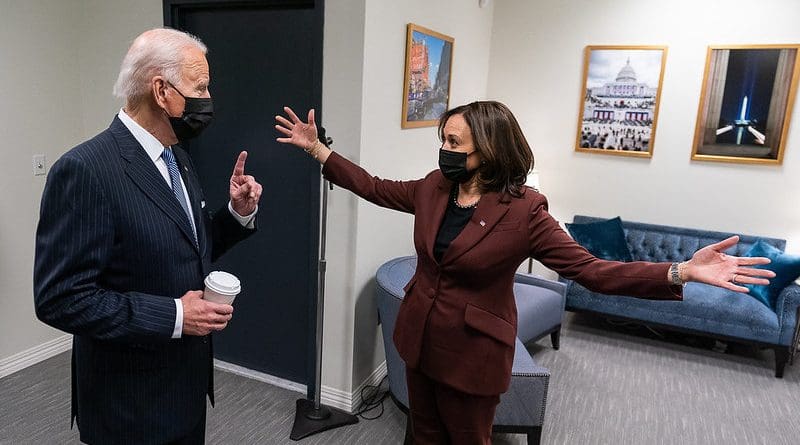For All America’s Polarization, Moderation Is Only Way Forward – OpEd
By Arab News
By Dr. John C. Hulsman*
In Washington, power — like water — always follows the path of least resistance. This, above all, explains why most presidents focus on foreign policy. The founders of the American republic ingeniously devised a system of political checks and balances that is so intricate that only rarely does a White House find itself able to really take charge of domestic affairs, as the political configuration required to do so only comes along very occasionally. In contrast, the constitution makes it clear that, in terms of foreign affairs, the president is first among equals and is the driving force in American strategic thinking.
Ironically, given his decades of expertise on the Senate Foreign Relations Committee, newly elected President Joe Biden finds himself at the helm of an administration that will probably be judged by what it manages to accomplish domestically, before the window to pass legislation runs out with the coming of the 2022 midterms. But history is full of such ironies.
It is not just the outcome of the 2020 US election that presents Biden with this rare chance to achieve domestically; it is the nature of his victory that is equally important. In the House of Representatives, the Democrats cling to a tiny nine-seat majority (221-212), the narrowest in a century. The Senate is even closer, being equally divided between the parties, with Vice President Kamala Harris breaking tied votes. Biden himself won the popular vote by a close but clear 52 percent to 48. This amounts to Democratic control across the board, but by the narrowest conceivable margins.
These are the two great political facts to emanate from the 2020 result: A Democratic wave, but by an eyelash. These dual factors, paradoxically, amount to an almost perfect political outcome for the moderate Democratic president, for the narrowness of the result means he is forced to spurn the progressive left in his own party and govern from the center if he is to get anything done in policy terms.
At the same time, with the Republicans out of power across the legislative board and embroiled in their own civil war over what to do with Donald Trump, Biden has only to marginally worry about them as well. In both cases, the outcome seems tailor-made for the moderate Biden to do as he would have ideologically liked to in any case.
As progressive leftist Rep. Alexandria Ocasio-Cortez rightly pointed out before the election, in Europe she and Biden would never have found themselves in the same party. There, in a proportional representation system, small, ideologically coherent parties win slivers of the vote and then do political battle in terms of forming governing coalitions with other less-than-majoritarian parties. This is not how it works in the first-past-the-post American system, where large, big tent parties first compete, with the winner then fighting things out within an administration to set the overall ideological tone of any presidency. In the US, it is the infighting within parties after an election that politically counts as much as the elections themselves.
Given the lack of any margin of error at all in the Senate, this means that — while the Democrats won a majority in both houses of Congress — the progressive politics of the left of the Democratic Party surely did not. Resolutely moderate Democratic senators such as Joe Manchin of West Virginia and Kyrsten Sinema of Arizona now control the fortunes of any legislation that is to have the slightest chance of making it through the upper chamber.
Manchin, particularly, is forthrightly on the record in his desire to quash the progressive leftist wish list in his own party, be the issue of Supreme Court packing, an expensive Green New Deal, abolishing the Senate filibuster (which presently requires 60 votes to pass most measures, entailing cross-party compromise) or the staffing of the new Biden White House with progressives. Off the record, these political strictures, which tilt the whole process toward the center, dashing the left’s hopes of radically revamping the country, suit Biden to the ground.
So, given this odd and largely beneficial new political configuration, what major domestic legislation is likely to pass over these next two years? First, Biden will get most of what he wants in terms of his $1.9 trillion COVID-19 relief plan. While the ultimate sticker price may be whittled down somewhat (largely at Manchin’s urging), the Democrats have the votes to pass this gigantic economic program, and quickly. Second, a $1 trillion infrastructure bill — to revamp America’s decayed roads, bridges, parks, and rural broadband — also looks eminently doable, especially as a good number of Republicans will at least consider voting for such a plan. If Biden can manage to pass both these major pieces of legislation — as the new, benign political configuration suggests he can — this would amount to a major historical domestic achievement.
The genius of America’s founders is plain. For all the crippling polarization of recent times, the election outcome has left moderation as the only way forward. Biden may prove himself savvy as president; he already finds himself lucky.
• Dr. John C. Hulsman is the president and managing partner of John C. Hulsman Enterprises, a prominent global political risk consulting firm. He is also senior columnist for City AM, the newspaper of the City of London. He can be contacted via chartwellspeakers.com.

